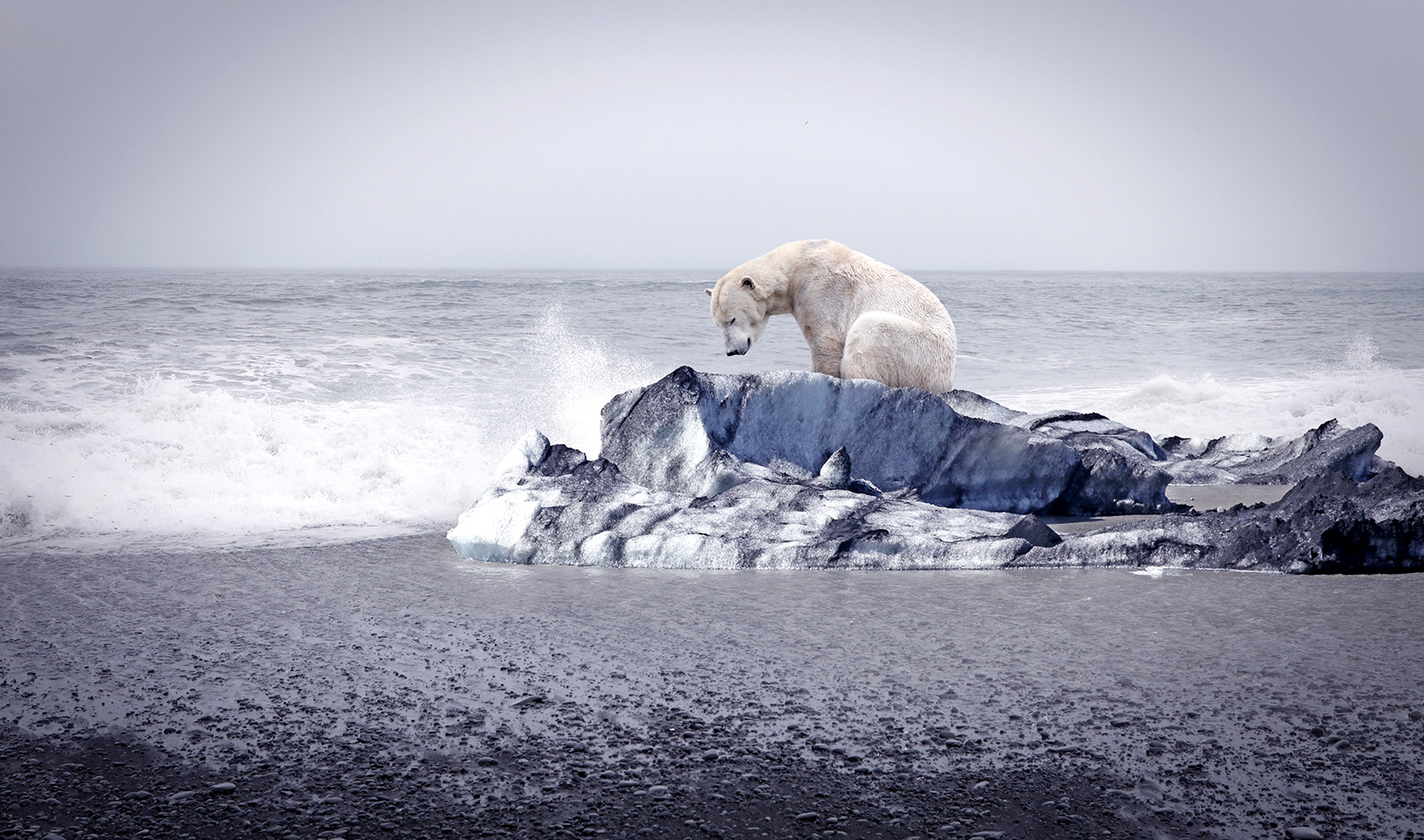
A polar bear sits on a small chunk of melting ice surrounded by water. Anxiety and distress over climate change is hitting younger generations particularly hard, with more than 50% saying humanity is "doomed."
Photo: Getty Images
Opinion polls show that large numbers of people, particularly younger generations, are feeling overwhelmed by the prospect of climate change and its impact on their lives. The term “climate dread” has been coined by therapists and support groups.
So how should companies respond to this among their employees? BRINK spoke to Britt Wray, author of Generation Dread: Finding Purpose in an Age of Climate Crisis.
BRINK: How widespread is this idea of climate dread, do you think?
WRAY: It’s very widespread. Eco-distress or eco-anxiety has actually been defined by the American Psychological Association as being the chronic fear of environmental doom. Of course, there are multiple co-occurring feelings that can come with that. So there’s anxiety or dread but also grief, sadness, rage, and anger about inaction and the injustices involved in the climate and wider ecological crisis.
‘You’ll Die of Old Age. I’ll Die of Climate Change.’
These kinds of feelings have been apparent in environmental justice communities, low-income communities and communities of color who have been fighting for environmental protections for some time. People working academically on the problem or political leaders or those in NGOs working to improve the situation also speak of mental exhaustion, burnout, and the psychological toll of staring into the abyss of the climate crisis eight-plus hours a day.
And now we have very alarming data showing just how prevalent this distress is within younger generations, which makes a lot of sense because young people today are inheriting an extremely ill state of the planet and being made aware of this often before they have the opportunity to explore important aspects of their identity and get out into the world.
They have also inherited the duty to clean it up because of failed leadership and inaction from older generations, so they carry with them signs that say, “Why should I study for a future I won’t have?” or, “You’ll die of old age. I’ll die of climate change.”
One study I was involved in that was published just a few months ago in the Lancet Planetary Health journal looked at this distress in 10,000 children and young people aged between 16 and 25 in 10 countries around the world in low-, middle-, and high-income settings.
Climate Change Interrupting Ability to Function
We tapped into young people in Australia, Brazil, Finland, France, India, Nigeria, Philippines, Portugal, the U.K. and the U.S. And the global respondents reported that climate change negatively affects their daily life and functioning at a high rate.
Forty-five percent of these young people said that climate change interrupts and disrupts their ability to eat, concentrate, go to work, go to school, sleep, spend time in nature, play, have fun, or be in relationships. So basically be an easeful young person.
Seventy-five percent of those young people said that the future is frightening. More than 50% endorsed the statement that humanity is doomed, which is a horrifying statistic to let land in your heart, and 39% of these young people said that climate change makes them hesitant to have their own children.
All of these things have huge economic implications and are things that managers should be aware of as a trend that could potentially become something significant.
So if they are a worker, that means that their ability to be focused at work can be disrupted because they are so hypervigilant with anxiety about the climate and ecological crisis if they are experiencing significant eco-distress.
Impact On the Economy
As young people are moving into the workforce, what happens when they start losing hope in the future, or they believe that there’s no point in getting an education in order to then go into the workforce because it won’t be there for a long time for them to be able to enjoy or become successful? That’s a signal of something very dangerous.
People refusing to reproduce would have enormous impacts on the economy and ways in which we orchestrate our society in relation to one another. That feeds into the educational sector and ways in which people are imagining where they’re going to migrate to, where they’re going to set up their home to live in.
All of these things have huge economic implications and are things that managers should be aware of as a trend that could potentially become something significant. Right now, we’re in the early days of starting to understand how young people are reshaping their futures based on their feelings around the climate and wider ecological crisis.
Support Groups Are Critically Important
BRINK: So how can we navigate this — how do we help build some kind of resilience?
WRAY: There’s a lot that people can do. One major issue with this form of distress is that it becomes really severe and unbearable for people when they sit in it alone. It’s not a place from which resilience and strength can be fomented because they are wondering if they’re the only ones feeling this way because it feels like no one cares.
It feels like you’re swimming in a sea of apathetic humans as we hop into our cars, fly around, burn fossil fuels, ignore the science, and continue to not make progress at huge negotiations like COP26. And in that way, people can get lost at sea with these feelings.
It becomes massively reduced and improved when those people find a place in which their feelings are validated and mirrored, legitimized, rather than someone saying, “Oh, don’t be so dire. You’re fine,” or, “You’re just being dramatic,” which can make people feel many times worse.
There aren’t social norms around how to process the heaviness of these feelings, but when they do find a safe place in which to explore these feelings, then some openings can occur. This might be from a climate-aware therapist, or a group that specifically exists in order to allow people to reckon over their climate feelings, such as the Good Grief Network or Climate Cafés or Climate Awakening, or the All We Can Save circles, or a variety of others that are emerging.
Activism Isn’t Always a Cure for Eco-Anxiety
Many assume the best way to combat these feelings is by getting active on the issue, right? So go out and join a green group or hit the streets with a protest movement, and you’re going to feel so much better because you know that you are aligning your values with your actions.
And of course, that does bring some psychological relief. However, what can often happen is that if people want to offset their distress by becoming good external activists, they can still totally ignore the internal processing of their thoughts and feelings.
If those external actions are not leading to the outcomes that people want them to, it can leave them in a really tricky place, right? If they’re clinging to an outcome that their activism is going to change the world in some way, but then the powers that be continue to squash that progress, that can leave people burning out.
People need to be strengthened at this time, internally strengthened and externally motivated, to be able to keep their eyes on the problem and not look away out of self-preservation as the climate crisis heats up. So it’s really taking an inside-out approach that values both activism as something that happens inside as well as outside.







